- HOME
- Alumni News
- Activity Reports
- Anjana (14th program) New house, new friends and independent living – August 2013
Activity Reports
Anjana (14th program) New house, new friends and independent living – August 2013
Report from Nepal: August 2013
I was very busy running a number of programs in August.
Friendship Day
August 4 is ‘Friendship Day’- which has been celebrated by young people here in Nepal over the past 5 years. So my friend, who also has a disability, and I also decided to celebrate it, and we got joined by 3 JICA volunteer workers, which was great. I spoke to them in Japanese. I also met my friends from my school days and people I had acquainted with in disability conferences. We all very happily became friends with each other.
 |
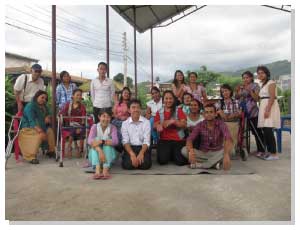 |
| Photos taken on Friendship Day | |
CIL Meeting
On August 7, I traveled to Kathmandu in order to attend the meeting at the Center for Independent Living. I was a member of the CIL 5 years ago. It usually takes about 6 hours to go to Kathmandu from Pokara, but due to the strike I spent 8 hours traveling. Once arrived at the CIL, I enjoyed reunion with all the members including my three fellow Duskin alumni. We had so much to catch up on. I noticed that the CIL membership had expanded. Deepak and I agree that we should be more engaged in barrier free campaigns in Nepal. We also wish to carry out a TRY in the country. And in order to achieve this, we need to get an enough number of Personal Assistants (PAs) to support us as activists. The CIL Kathmandu implements various activities and its staff people include some with severe disabilities. However, at the moment these members can only participate in meetings on an occasional basis. A 3-hour PA service would enable them to participate in many more activities every week.
On that day, I stayed with a friend of mine. Her house has a step outside the house, so I asked them to make a slope – and they prepared a wooden one for me.
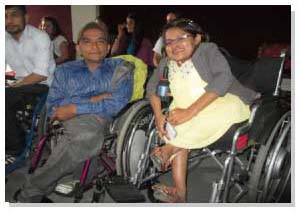
Me with Deepak – he is like my brother
New house
On August 15, I found my new home. Yay! ! As there was no slope in this house, I made it by myself. My landlord and I also modified the toilet. Now, the house is disability-friendly. I can welcome my disabled friends here. But the house hunting was such an exhausting work that I got sick as soon as I moved in. Around that time, my organization (ILS-Nepal) was having 3 British women, who had come to teach English. It was arranged that they would stay in my house for 2 weeks. Unfortunately I could not attend their lessons because of sickness, but I learned Spanish from them in the evening.
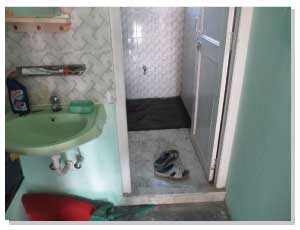 Old toilet |
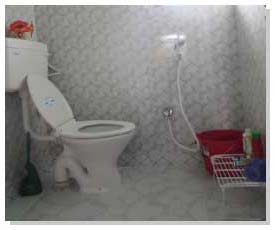 New toilet |
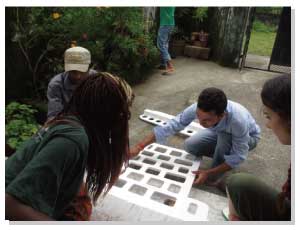
Making the slope
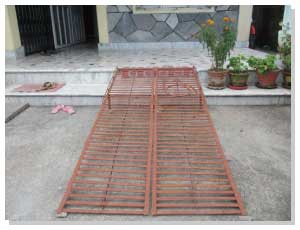 Slope is completed! |
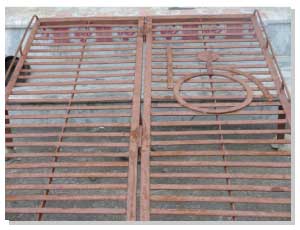 A wheelchair is drawn on the slope |
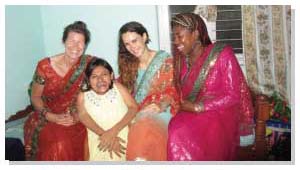
3 people from Britain. They are dressed in Saree
Home Visit
I visit friends of mine who has a disability to observe their daily living. As I saw Anju’s life I felt sad because life was hard for her. Reena’s life is not so inconvenient but she has no freedom. Fadhindra lives with her family and has a comfy life, taking pity on other disabled people. She does not believe in the idea of independent living. When I met my friends I also met their families and talked a lot. The home visits reassured me of the importance of changing the minds of people around us. Some are faced with hardship in life while others have a comfortable life at home. But what they have in common is that their human rights are violated – because they have no freedom. They are unable to go out on their own, which I think is unfortunate.
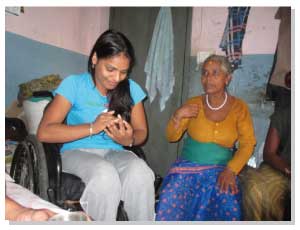 Anju and her mum |
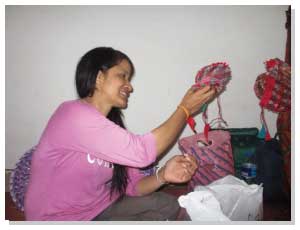 Reena showed me her handcrafts |
English lessons held in my house
Currently our office is remotely located, so it is hard for me to meet up with my friends and colleagues every day. As my house had quite a convenience location, my friends who could not make it to office came to my house instead and studied English. It was easy for them to travel to my house in their wheelchairs, but they would not manage the acclivity on their way back. So I asked the volunteer English teachers to take them home.
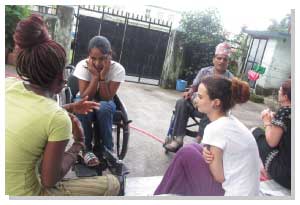
English lessons
Woman’s Meeting
Men and women do not enjoy equal treatment in Nepal. Women tend to not to be confident enough to express their opinions. But if all women gain confidence in themselves they will be able to make speeches. At present, men do not understand women well. This can be changed if we speak up. Things have been improving for disabled men disabilities but so much for disabled women. If we can all act together regardless of our gender, we will be able to enjoy expanded friendship and generate a much large-scale movement. Therefore, we discussed what we could do. Since I returned to Nepal, I have been wishing to learn more about Peer Counseling in Japan.
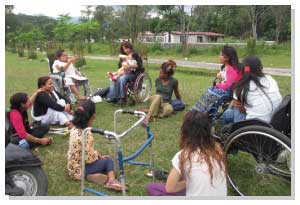
Women’s meeting
Sila with Osteogenesis Imperfecta
When I participated in a program I met a woman who had the same disability as mine - Osteogenesis Imperfecta. She is called Sila. She never spoke in front of her mum. But when her mum was away, she started to chat with me. She left school and stays home now, she told me. Her school was full of barriers and the road from her home to the school was rough. One day Sila fell of her wheelchair in front of the school gate. This traumatized her. She gradually stopped going to school and eventually quit it. She is so sad about this and does not want to see anyone. I later spoke to her mum. She said, “My life is so hard because of my daughter’s disability. And I wonder what will happen to her if I die.” We often hear this question in Nepal. Instead of answering her I invited Sila and her daughter to my house – I thought it would be best for them to see my independent living. When they come to my place, I will talk a lot with them, which, hopefully, will give them some hints. I am now contemplating how Sila will be able to go back to school.
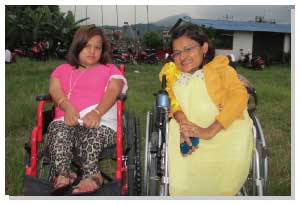
Me with Sila
I have recently joined in the network called Democracy and Elections Watch (DWE-Nepal). This network is engaged in election-related activities. In 2 month time we are electing people who will develop laws. I have become their admin officer so that I would be able to make sure that disabled individuals participate as an elector and wheelchair users can access a polling station. We meet up once or twice a month to reflect our activities and draw future plans. Being the only member with a disability and also the youngest, I face lots of challenges. For example, I am assigned as a note-taker, but with little experience in note-taking I quite struggle every time. So I feel nervous whenever there is a meeting, but I will keep practicing.
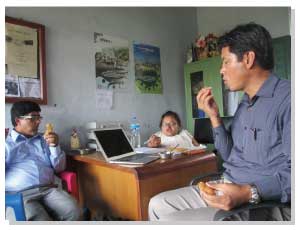
Meeting of DWE-Nepal
Fun Times
I have been to various places. For instance, I visited a lake with my friends. Also, I watched others playing basketball (I was slightly too short to play that sport). What’s more, I have been to a disco in my wheelchair and enjoyed dancing, he he (^^)v. Whenever I do this kind of things, people stare at me with surprised faces. I also went to a restaurant with my friends from abroad. There is no barrier free place in Pokhara, but the streets are getting more paved. So it has become a little easier for me to go out to town.
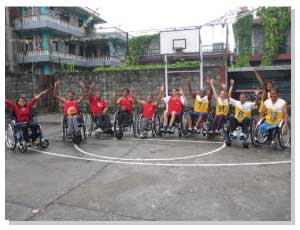 Basketball |
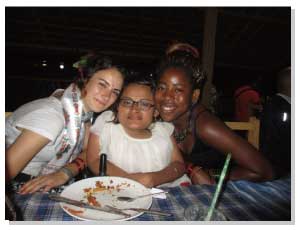 Dining with my foreign friends in a restaurant |
Some Thoughts
This August I have worked very hard even when I fell sick. In addition to what I have said above, I re-wrote the “We too…”campaign proposal in English. I will take this proposal to schools and appeal for accessible facilities such as a slope over steps and a barrier free toilet. If we succeed in this campaign, our movement will be accelerated and more efficient. However, as there is no full-time staff in office at the moment, I will take my time doing things rather than rushing.
Currently I am independent, and this makes me happy. I am totally indifferent to any other kinds of job. I want to keep engaged in our activities with my peers. If when I have time to spare, I carry out an Internet search and network with people from other organizations. Sometimes my mum asks me, “What on earth are you doing? Why are you not looking for a job?” (laughter).
“Finding what you want” is really hard work, isn’t it? The house hunting has taken me no less than a month. And now, I am searching for something else. Well, I am looking for someone who can be my PA!! He he (^o^)/. I believe that I will find a suitable person if I give myself plenty of time to do it. Whenever I feel lonely I chat with my friends on the Internet. I don’t lose temper so easily now. I wonder why – perhaps it is because I am capable of doing many things independently. I can confidently talk to people about myself and my disability now. And I don’t get worried about things. If I find myself in trouble, I say to myself, “Everything will be just fine.”
I have support from my friends in Japan. My electronic wheelchair takes me almost everywhere. And independent living is fun – I will do my best to keep up with this way of life. I want to create a society where all my friends with disabilities can enjoy independent living.
Anjana KC
(14th program)
Pokhara, Nepal




